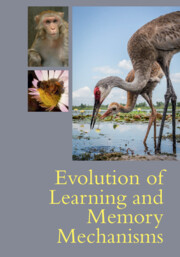Book contents
- Evolution of Learning and Memory Mechanisms
- Evolution of Learning and Memory Mechanisms
- Copyright page
- Contents
- Figures
- Tables
- Contributors
- Preface
- Introduction
- Part I Evolution of Learning Processes
- 1 Learning and Memory in the Nematode Caenorhabditis elegans
- 2 Adaptive Evolution of Learning and Memory in a Model Lineage
- 3 Learning in Insects: Perspectives and Possibilities
- 4 Experimental Evolution and Mechanisms for Prepared Learning
- 5 Evolutionary Processes Shaping Learning Ability in Insects
- 6 Brain and Spatial Cognition in Amphibians
- 7 Pavlovian Conditioning, Survival, and Reproductive Success
- 8 Compensatory Responses to Wildlife Control
- 9 Relational Memory Functions of the Hippocampal Pallium in Teleost Fish
- 10 Mechanisms Underlying Absolute and Relative Reward Value in Vertebrates
- 11 The Optimality of “Suboptimal” Choice
- 12 A Behavior Systems Framework
- 13 Dissociable Learning Processes
- 14 Social Learning Strategies
- 15 How Learning Affects Evolution
- Part II Evolution of Memory Processes
- Index
- References
7 - Pavlovian Conditioning, Survival, and Reproductive Success
from Part I - Evolution of Learning Processes
Published online by Cambridge University Press: 26 May 2022
- Evolution of Learning and Memory Mechanisms
- Evolution of Learning and Memory Mechanisms
- Copyright page
- Contents
- Figures
- Tables
- Contributors
- Preface
- Introduction
- Part I Evolution of Learning Processes
- 1 Learning and Memory in the Nematode Caenorhabditis elegans
- 2 Adaptive Evolution of Learning and Memory in a Model Lineage
- 3 Learning in Insects: Perspectives and Possibilities
- 4 Experimental Evolution and Mechanisms for Prepared Learning
- 5 Evolutionary Processes Shaping Learning Ability in Insects
- 6 Brain and Spatial Cognition in Amphibians
- 7 Pavlovian Conditioning, Survival, and Reproductive Success
- 8 Compensatory Responses to Wildlife Control
- 9 Relational Memory Functions of the Hippocampal Pallium in Teleost Fish
- 10 Mechanisms Underlying Absolute and Relative Reward Value in Vertebrates
- 11 The Optimality of “Suboptimal” Choice
- 12 A Behavior Systems Framework
- 13 Dissociable Learning Processes
- 14 Social Learning Strategies
- 15 How Learning Affects Evolution
- Part II Evolution of Memory Processes
- Index
- References
Summary
Learning enables organisms to make adaptive modifications to ecological circumstances. Pavlovian conditioning is a specific form of learning that involves learning about predictive relations between events in the environment and enables animals to form associations that facilitate adaptive modifications in behavior in both appetitive and aversive contexts. Pavlovian conditioned stimuli are functionally important because they prepare organisms to interact with biologically relevant stimuli, such as potential mates, and facilitate how those interactions occur. Research with various species indicates that Pavlovian conditioning influences physiological responses that affect reproductive success. In this chapter, we review how Pavlovian conditioning results in enhanced reproductive physiological responses, increased success in fertilization, and increased numbers of offspring produced. Research has shown that animals that had a chance to learn about mating opportunities have a distinct reproductive advantage over those that did not and therefore are more likely to contribute their genes to future generations. This research informs our understanding of how Pavlovian learning is not just a proximate mechanism of behavior, but also has a role in genetic transmission and thereby contributes to the future course of evolution.
Information
- Type
- Chapter
- Information
- Evolution of Learning and Memory Mechanisms , pp. 125 - 142Publisher: Cambridge University PressPrint publication year: 2022
References
Accessibility standard: Unknown
Why this information is here
This section outlines the accessibility features of this content - including support for screen readers, full keyboard navigation and high-contrast display options. This may not be relevant for you.Accessibility Information
- 4
- Cited by
